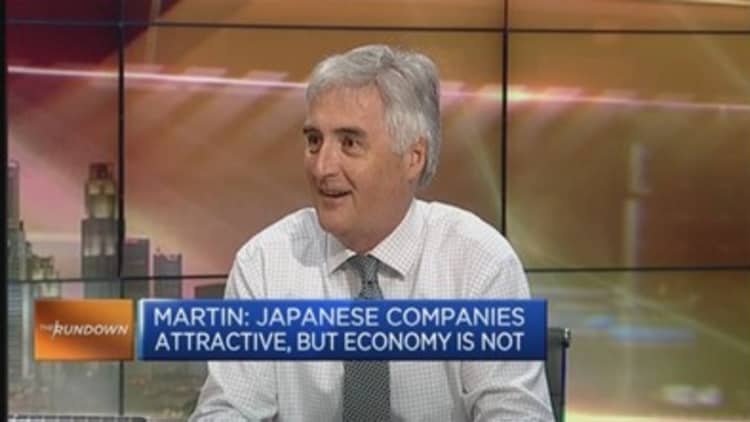Flush with cash from the Bank of Japan's (BOJ) stimulus effort, lenders won't be put off from financing Japan Inc's habit of paying too much for overseas acquisitions, even as a weaker yen makes those deals more expensive, analysts say.
"The banks need someone to lend to and M&A (merger and acquisition) financing is one of the few growth areas for them," said Barclays bank analyst Shinichi Tamura. As long as a company "looks creditworthy enough to pay back the loan, the banks will be happy to back the deal."
Deal volumes sank to a twelve-year low in 2014, but a recent flurry of M&A deals suggests Japanese companies are ready to shop overseas again.
Last week, Japan Post made a $5.12 billion bid for Australia's Toll Holdings. On Monday, chemicals company Asahi Kasei announced it would buy U.S.-based Polypore's energy storage business for $2.2 billion. On Tuesday, Hitachi announced it would buy Finmeccanica's transportation operations for 800 million euros ($909 million).

Whether the companies pay too much for overseas acquisitions is not the banks' problem, according to Japan Macro Advisors chief economist Takuji Okubo: "That's the company's problem – the banks only care about the creditworthiness of the acquirer's parent company."
Desperate for borrowers
Japanese banks have faced a predicament for years: despite low interest rates, they can't find enough borrowers.
The situation took a turn for the worse after the BOJ launched an unprecedented asset purchase program in April 2013. The program involves buying government bonds – the main source of yield income in the past for banks. Yields have trended ever lower but failed to stimulate any new demand for loans.
As a result, margins on bank loans in Japan continue to skim record lows. For example, the lending rate on domestic loans at Mitsubishi UFJ Financial Group, one of the country's biggest banks, slipped to 1.10 percent in the last three months of 2014, from around 1.3 percent in early 2013, before the BOJ started its massive asset purchase program.
Read MoreIs Japan Post overpaying for Toll?
That makes shorter M&A financing package loans that carry higher risk premiums and yields more attractive for banks, said Barclays' Tamura. A typical loan will be rolled over into a three- to five-year syndicated loan, he said.
"The banks are desperate and are willing to take on the risks," said Japan Macro Advisors' Okubo.
But banks aren't overly concerned about the risk factor.
"Private sector banks believe the loans carry implicit government guarantees" because public sector banks like Japan Bank for International Cooperation lead the M&A financing consortiums, Okubo said.
Race against time
Japanese companies may not need to worry about financing their overseas shopping sprees, but they should worry about the potential for further yen weakness, analysts said.
Prime Minister Shinzo Abe's economic policies, dubbed Abenomics, and the BOJ's quantitative easing efforts have weakened the yen by over 40 percent since Abe returned to power in December 2012. Many analysts expect the yen to weaken further.
"It makes sense for companies to be pre-emptive and do deals before the yen weakens anymore," said BNP Paribas chief credit analyst Mana Nakazora.
Given strong cash balance sheets and a shrinking domestic market, that appears likely, according to PwC Corporate Finance director Gregory Bournet. He expects the number of outbound M&A deals to rise to 20 percent of all deals in fiscal 2015 from 10 percent in 2014.

